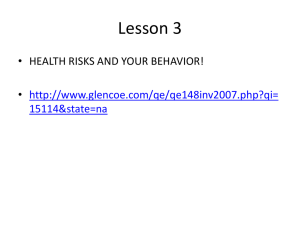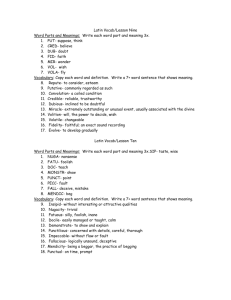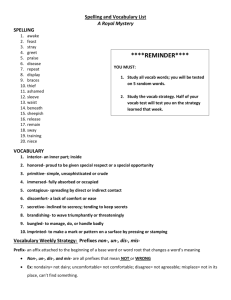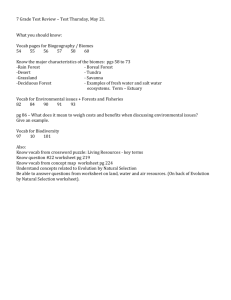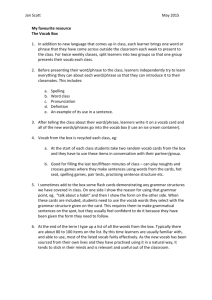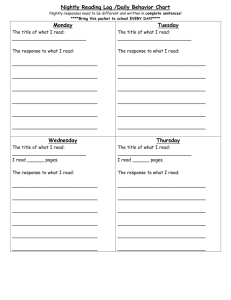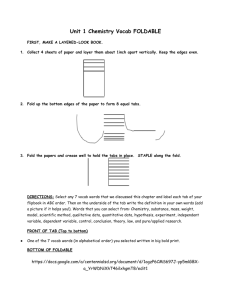Syllabus: Colloquial Arabic – Levantine - ARAB-152
advertisement
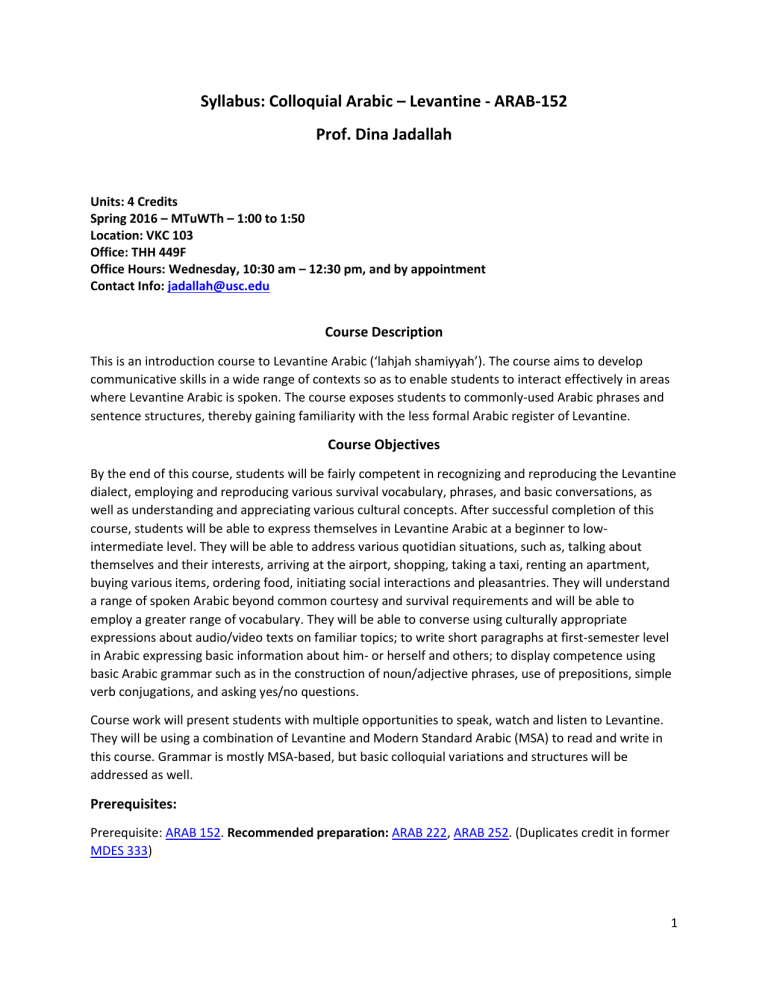
Syllabus: Colloquial Arabic – Levantine - ARAB-152 Prof. Dina Jadallah Units: 4 Credits Spring 2016 – MTuWTh – 1:00 to 1:50 Location: VKC 103 Office: THH 449F Office Hours: Wednesday, 10:30 am – 12:30 pm, and by appointment Contact Info: jadallah@usc.edu Course Description This is an introduction course to Levantine Arabic (‘lahjah shamiyyah’). The course aims to develop communicative skills in a wide range of contexts so as to enable students to interact effectively in areas where Levantine Arabic is spoken. The course exposes students to commonly-used Arabic phrases and sentence structures, thereby gaining familiarity with the less formal Arabic register of Levantine. Course Objectives By the end of this course, students will be fairly competent in recognizing and reproducing the Levantine dialect, employing and reproducing various survival vocabulary, phrases, and basic conversations, as well as understanding and appreciating various cultural concepts. After successful completion of this course, students will be able to express themselves in Levantine Arabic at a beginner to lowintermediate level. They will be able to address various quotidian situations, such as, talking about themselves and their interests, arriving at the airport, shopping, taking a taxi, renting an apartment, buying various items, ordering food, initiating social interactions and pleasantries. They will understand a range of spoken Arabic beyond common courtesy and survival requirements and will be able to employ a greater range of vocabulary. They will be able to converse using culturally appropriate expressions about audio/video texts on familiar topics; to write short paragraphs at first-semester level in Arabic expressing basic information about him- or herself and others; to display competence using basic Arabic grammar such as in the construction of noun/adjective phrases, use of prepositions, simple verb conjugations, and asking yes/no questions. Course work will present students with multiple opportunities to speak, watch and listen to Levantine. They will be using a combination of Levantine and Modern Standard Arabic (MSA) to read and write in this course. Grammar is mostly MSA-based, but basic colloquial variations and structures will be addressed as well. Prerequisites: Prerequisite: ARAB 152. Recommended preparation: ARAB 222, ARAB 252. (Duplicates credit in former MDES 333) 1 Students should also have an open mind, a commitment to full participation, and the desire to have fun while learning. How to Excel in This Class: 1. Show up and actively participate. You can prepare in advance by thinking about the questions that may be asked during class and the activities that may be performed so that you can practice beforehand. Prepare a list of questions regarding difficulties you may. 2. Repeat, Repeat, Repeat. Practice new words, phrases, and dialogues throughout your day. Remember to LOOK, LISTEN, SAY, and WRITE. Don’t just think Arabic … say it out loud. 3. Own The Vocabulary. Make new words meaningful to you. Think about how you may use them to express something about you/others in your daily life. Create sentences to practice saying and writing. Make flash cards with useful vocabulary, verb forms, expressions, synonyms, antonyms, and even sentences that you want to use successfully. Carry them with you and do 1-5 minute study sessions throughout the day. 4. Guess. All language acquisition involves guesswork. Practice filling in gaps based on your best judgment. 5. Make mistakes. It’s absolutely OK to make mistakes in learning a language. Learn from your own and others’ mistakes. 6. Get exposure/develop an “ear” for the language. Join online networking groups, listen to Arabic radio stations, watch Arabic films, and welcome any opportunity to speak with fellow students and native speakers. 7. Take good notes and organize. Writing good notes helps in reinforcing learning and capturing information for study/recall. Make a separate binder so that you can organize according to such headings as: Alphabet/Diacritical Marks; Vocabulary; Synonyms; Antonyms; Grammar; Writing Practice; and Essays. 8. Language helps develop creativity and facilitates learning in other areas of your life. Invest two to three hours of self-study for every hour of class. This means that you should plan on spending a minimum of 12 hours/week dedicated to learning Arabic. Master each new building block of knowledge so that new material will make sense. Required Book and DVD ‘Arabiyyat al-Naas (Part One): An Introductory Course in Arabic, DVD Edition, by Munther Younes, Makda Weatherspoon, Maha Saliba Foster, (Routeledge, 2013). Requirements and Assessment Participation: 20% 2 The student's classwork grade includes participation, and if a student's not present, s/he can't participate. Participation means reading assigned homework, watching assigned video clips, learning new vocabulary, and reading the grammar explanations in the book before coming to class so that class time could be devoted to activating the new materials. The student is allowed three unexcused absences per semester. Every other absence thereafter will result in the deduction of 1.5 points from the student’s participation grade. This percentage basically represents the classwork for one session (60 sessions x 1.5 = 90; plus a 10 point bonus to reach 100). So if a student gets 89% for their classwork, they'll receive 87.5% (one absence), 86 (2 abs.), 84.5 (3 abs) etc. An excused absence means a written note from the appropriate office (doctor, coach, dean) justifying the absence. Please inform me of absence as soon as possible. To succeed in a language classroom, you must take an active part in your learning. Come to class prepared, and participate as much as you can. You are expected to use Arabic to communicate with your classmates and instructor at all times during class. This effort will help you make rapid progress in the acquisition of new language skills. Your class work grade is a reflection of your language learning activity. It is based on your level of preparation (completion of assigned readings and activities prior to class), the quantity of your participation (involvement, effort, positive attitude) as well as the quality of your participation (fluency, accuracy, pronunciation). If you appear not to be prepared, your grade will suffer. If you are prepared and do not participate, your grade will suffer similarly. If you miss class, not only will you rapidly fall behind but you will not be able to participate and your lack of attendance will therefore negatively influence your class work grade. Your overall classwork grade will be reduced by 1.5 points for every unexcused absence (one class hour or portion thereof). Homework: 20% There will be daily written assignments. Homework is due at the beginning of class on the day for which it is assigned. Late homework assignments will be corrected but will not be given any credit. Please hand in homework on a separate sheet of paper. For each assignment, please include the date as well as the lesson, exercise, and page number. Please note that, because this is a colloquial class, a good portion of the homework assignments must be turned as audio recordings; I will announce which exercises should be turned in as such during class. Daily homework assignments will be rated on a scale from 1 to 3 (3= excellent/very good, 2= good but not your best effort, 1= poor or sloppy work). You will be rated on the overall quality of your work, not on the number of correct or incorrect answers. Homework assignments are intended to enhance your learning of the new material. So, spend time on your homework assignments and make sure that what you submit reflects your absolute best. You should expect 10 hours per week of homework for this course. It is typical for students to spend 2 to 3 hours daily, 7 days a week on their work for this course. 3 When you get back your assignment, you should go over it to see where you made mistakes and make sure you understand the corrections. Quizzes: 10% There will be 5 pop quizzes during the semester. These quizzes will typically last 10 minutes and are designed to test new vocabulary. Mid-terms: 15% + 15% = 30% Two mid-terms are scheduled for this course, on Monday, February 8, 2016 and on Monday, March 21, 2016. They will include oral portions. Final Exam: 20%. The final exam will contain written, oral, and listening portions. The final is scheduled by the USC for Wednesday, May 6, 2-4 pm. Course Schedule – subject to change Week 1 1/11 1/12 1/13 Topics/Daily Activities Readings and Homework Introduction & Review; Common Expressions No assignment for first class Unit 1: Ex. 8 (p. 21); Ex. 6 (p. 27) Review polite greetings (p. 28), Ex. 3 (p. 29); Ex. 3 (p. 38-39) 1/14 Unit 2: Ex. 6&7 (pp. 4547) Week 2 1/18 Martin Luther King’s Birthday 1/19 Ex. 7-8 (pp. 47-48); Ex. 1 (p. 49) Deliverable/ Due Dates Grammar, feminine gender, relative adjective النسبة, singular, dual, plural: pp. 18, 24 Possession, the construct اإلضافة: pp. 27, 36 الصفEx. 1-5 (pp. 44-46); دول وعواصم عربيةEx. 1-5 (pp. 46-47) الساعة وأيام األسبوعEx. 4,5,6 (pp. 47-53) 4 شهور السنةEx. 2,3,6 (p. 54) 1/20 Ex. 1 (p. 52), Ex. 4 (p. 53), Ex. 5 (p. 53) 1/21 Ex. 7 (p. 56); Grammar, Ex. 8&9 (p.60) Week 3 1/25 Ex. 7 (p. 62); Ex. 8-10 (pp. 65-66) 1/26 Song (p. 72); Ex. 1-4 (p. 73-74 1/27 1/28 فصول السنة والطقسEx. 1, 2-5 (pp. 54-56); البيت والمواصالت Ex. 2-7 (pp. 58-59) العائلة والمهننEx. 1-6 (pp. 6061); المالبس واأللوانEx. 1-7 (pp. 63-65) األكلEx. 1-7 (pp. 66-69); Review Vocabulary (pp. 7072); Translate into Arabic (write and speak about yourself) Ex. 6&7 (p. 75) Unit 3: Passport control; passenger; vocab practice Study Vocab p. 77, Ex. 1-2 (pp. 78-79). Watch إملي في تأشيرة دخول،( المطارpp. 7980); Ex. ( كتابة في البيتp. 80) Cab role-playing; vocab practice Watch ( تاكسي للفندقpp. 8283); Listen and read p. 84 and answer questions on p. 85 and Ex. 1. Read grammar (pp. 85-90); Ex. 1 (p. 86) and Ex. 4-5 (pp. 88) Week 4 2/1 Possession, comparative, negation, past, sociolinguistic corner, Ex. 6 (p. 88) 2/2 Ex. 2 (pp. 91-92); dialogue Ex. 4 (p. 92); Crossword puzzle (p. 93) Study new vocab (pp. 9091); Ex. 1 (p. 91), Ex. 3 (p. 92) 2/3 Unit 4: Hotel role playing; vocab practice Watch: ;إملي في الفندقVocab (pp. 94-95); Ex. 1-2 and questions (p. 96); Read pp. 96-97 and answer questions (p. 97) 2/4 Cab role playing, vocab practice, questions (p. 100) ;في التاكسيStudy vocab 9899; Read/listen p. 99 Week 5 First Mid-term Exam 2/8 Study for mid-term First Mid-term Exam 2/8 5 2/8 2/9 Possession, كان, ordinal numbers; Ex. 3-5 (p.104105) 2/10 Watch ضيعت جواز السفر and Read ;صندوق الموجودات pp. 108-109 جواز السفرVocab (pp. 106107); Ex. 1-2 (p. 107) Vocab practice; dialogue practicing audio-visual material Watch إسمك الكامل لو سمحت and answer questions, (p. 109); Read/listen مذكرات إملي and answer questions (pp. 110-111) 2/11 Week 6 2/15 President’s Day 2/16 Grammar exercises 2/17 Ex. 4-5 (pp. 118-119) Grammar (pp. 100-102); Vocab (pp. 102-103); Ex. 2 (p. 103) Read Grammar (pp. 111115), negation (p. 112), ( اإلضافةp. 111) Vocab (p. 116); Ex 1-3 2/18 Week 7 2/22 2/23 2/24 Unit 6: ;األكل في المطعم practice vocab; role play restaurant Vocab (pp. 120-121); Ex. 1-2 (p. 121) Answer questions (p. 124); Watch في مطعم السالم (pp. 124-125) Watch ( فيه مطعم قريب؟p. 122), questions (p. 122) Vocab practice, restaurant role-play Practice Grammar 2/25 Vocab practice; Song (p. 133) Week 8 2/29 Ex. 1-2 (p. 134) and Ex. 6 (p. 136) Read (p. 125); Watch إذا بدك ( أكل عربي كويسp. 126) and answer questions (p. 127) Read Grammar (pp. 127130); ب، كل، بدimperfect; comparative, superlative; ال ;وهللاEx. 2 (p. 130), Ex. 4 (p. 131) Vocab (p. 132); write 10 sentences with new terms Ex. 3 & 5 (p. 135) – first part only. Prepare Ex. 6 for class. 6 3/1 Unit 7: السكنPractice Vocab 3/2 Watch ( فيه غرفة لإليجار؟p. 140) and questions (p. 141) Read and answer questions (pp. 139-140). 3/3 Vocab and dialogue: renting/apartment living role-playing Listen and read مذكرات أملي and do vocab (p. 142). Questions (pp. 142-143) Week 9 3/7 Practice Grammar Grammar (pp. 143-146); األمر، راحEx. Table (p. 144); agreement in nounadjective, case system, sociolinguistic corner, ما،ال بعرف Song (p. 148); dialogue (p. 149) Vocab (pp. 146-147); prepare to discuss in class: Ex. p. 149. Unit 8: التسوقPractice Vocab. Watch إملي بدها ( تشتري سريرpp. 151-152) Vocab (pp. 150-151) and Ex. 1-2 (p. 151) 3/8 3/9 3/10 Spring Recess 3/14 to 3/20 Week 10 3/21 Review Vocab and role play at the market Vocab (p. 137); Ex. 1-2 (p. 138). Watch وين رايحه تسكني ( يا أملي؟p. 138-139) Vocab 152 and questions. إملي في الملحمةVocab and questions, p. 153 Second Mid-term Exam 3/21 Prepare for Second Midterm Exam 3/21 Vocab and role play, shopping and comparing Amman with the U.S. في سوق الخضار ومذكرات أملي Vocab and questions (pp. 153-155) Second Mid-term Exam 3/21 3/22 3/23 Ex. 2 (p. 157); Practice grammar 3/24 ، إنتو، إحنا، ه َّم، ف، و، مش،ليش ، كمان، لما، هيك، مش،أقل من كثير هون، مبارح،رحت. Ex 1 (p. 152) and roots and اإلضافة Ex. 4 (159). 7 Ex. 1, (p. 161); dialogue (p. 163); جذور وعائالت Vocab (pp. 160-161); comparative sentences in Ex. 2-3 (p. 162); prepare for dialogue in class (p. 163) Week 11 3/28 Unit 9: ;في دكان المالبس watch ! ;ما أحلى هالكوفيهand questions (p. 166) Vocab (p. 164); Ex. 1 (p. 165); watch إملي تشتري ( المالبسp. 165); questions (p. 166) 3/29 Practice vocab; role play shopping for clothes 3/30 Practice vocab and role play comparative shopping experiences; Ex. 2 (p. 169) ;مذكرات إمليvocab and questions (pp. 167-68); Ex. 1 (pp. 168-169) 3/31 Sociolinguistic corner, p. 171 Grammar; verbs; Ex. 1 (p. 169); plural possessive nouns; Ex. 2a (p. 170) Week 12 4/4 Ex. 5 (p. 174); Describe someone in class/famous personality; Ex. 6 (p. 174) Vocab (p. 172); Ex. 1-3 (pp. 173-174) 4/5 Unit 10: ;الدراسةPractice vocab Vocab (pp. 175-176); Ex. 1 (p. 176) 4/6 Practice vocab and role play ( إملي في دكان المالبسpp. 166167); questions (p. 167) Watch ;دراسة إمليvocab and questions 9p. 176); الجامعات ;األمريكية والجامعات األردنية vocab and questions (p. 177) 4/7 Ex. 1 (p. 177); ;الجمعvocab practice الجامعات الجامعات عربية قديمة:;القراءة vocab, Ex. 1 and questions (pp. 178-179) Week 13 4/11 Translate using شاميp. 182 and question 4 (pp. 183-184); Ex. 3 (p. 183) Grammar من، من أكبر،من أهم ،+comparative adjective, negation, lack of existence ما, verb-subject disagreement, relative pronounces, no passive formation and moods of 8 imperfect verbs in ;شاميpp. 182-184; Ex. p. 182. 4/12 4/13 4/14 Week 14 4/18 Vocab and grammar practice; Ex 1 & 3; dialogue question 1 or 2 (p. 188) Unit 11: ;المهنVocab and dialogue p. 191. Dialogue Ex. 1-2 (p. 192) Ex. 1 (p. 194); dialogue about work and family 4/19 Ex. 1 (pp. 197-198); Practice grammar 4/20 Crossword puzzle Ex. (pp. 201-202); dialogue (p. 202) 4/21 Unit 12: ;اإلكل والطبيب polite expressions and meals dialogue (p. 205) Week 15 4/25 Song Ex. 2 (p. 215); خمن ;الكلمةdialogue 4/26 Unit 13: ;المواصالتEx. 2 (p. 218); ex. 1 (p. 218); short dialogues Vocab (p. 185); song (p. 186); prepare dialogue for question 1 or 2 (p. 188) Vocab (pp. 189-191); Ex. 1; ;عائلة إملي وعائلة فدوى questions (p. 191) Watch ;أنت مخطوبة وال أل؟ vocab and questions (p. 192) Vocab (pp. 203-204); questions (p. 204); watch شاي أو قهوة، ;المنسفquestions (p. 205) Watch في وجع في راسي وبطني and ;كلنا أكلنا منسف وما مرضنا vocab and questions (pp. 206-207) Listen/read مذكرات إمليand ;رحلة إملي إلى إربدvocab and questions (p. 208) Grammar, past, roots and verb stems, sociolinguistic corner (pp. 210-213); Ex. 2 (p. 210) and Ex. 4 (p. 212) Vocab review (pp. 213-214); prepare dialogue Ex. 3 (p. 215). Vocab and Ex. 1 (p. 216); watch وال تاكسي، سرفيس،;باص vocab and questions (p. 217); إملي تحكي مع سائق 9 ;التاكسيvocab and questions (p. 218) 4/27 4/28 Sentence formation and short dialogues (p. 219) Watch رايحة تشتغلي مع المخابراتand ;التاكسي المميز Questions (p. 219); transportation and vocab (pp. 220-221) Review for final exam. FINAL 5/6 May 6, 2-4 pm Date: For the date and time of the final for this class, consult the USC Schedule of Classes at www.usc.edu/soc. Statement on Academic Conduct and Support Systems Academic Conduct Plagiarism – presenting someone else’s ideas as your own, either verbatim or recast in your own words – is a serious academic offense with serious consequences. Please familiarize yourself with the discussion of plagiarism in SCampus in Section 11, Behavior Violating University Standards https://scampus.usc.edu/1100-behavior-violating-university-standards-and-appropriate-sanctions. Other forms of academic dishonesty are equally unacceptable. See additional information in SCampus and university policies on scientific misconduct, http://policy.usc.edu/scientific-misconduct. Discrimination, sexual assault, and harassment are not tolerated by the university. You are encouraged to report any incidents to the Office of Equity and Diversity http://equity.usc.edu or to the Department of Public Safety http://adminopsnet.usc.edu/department/department-public-safety. This is important for the safety of the whole USC community. Another member of the university community – such as a friend, classmate, advisor, or faculty member – can help initiate the report, or can initiate the report on behalf of another person. The Center for Women and Men http://www.usc.edu/student-affairs/cwm/ provides 24/7 confidential support, and the sexual assault resource center webpage http://sarc.usc.edu describes reporting options and other resources. Support Systems A number of USC’s schools provide support for students who need help with scholarly writing. Check with your advisor or program staff to find out more. Students whose primary language is not English should check with the American Language Institute http://dornsife.usc.edu/ali, which sponsors courses and workshops specifically for international graduate students. The Office of Disability Services and Programs http://sait.usc.edu/academicsupport/centerprograms/dsp/home_index.html provides certification for students with disabilities and helps arrange the relevant accommodations. If an officially declared 10 emergency makes travel to campus infeasible, USC Emergency Information http://emergency.usc.edu will provide safety and other updates, including ways in which instruction will be continued by means of blackboard, teleconferencing, and other technology. 11
